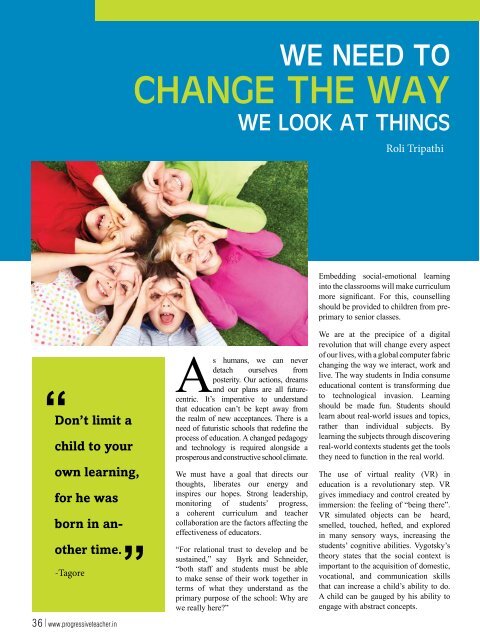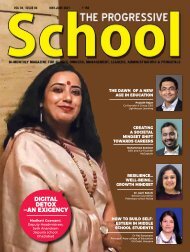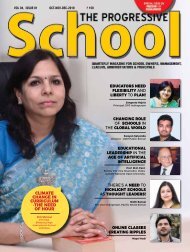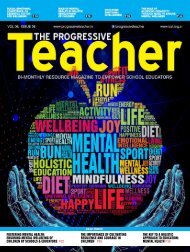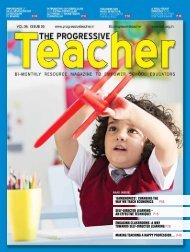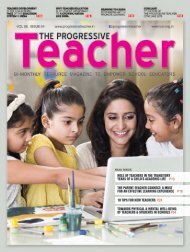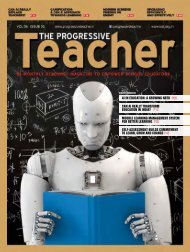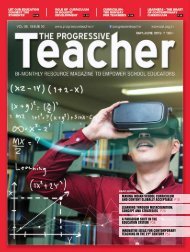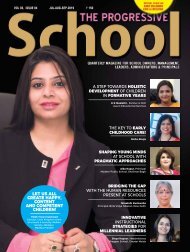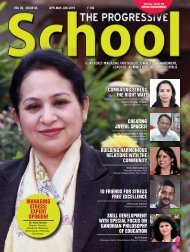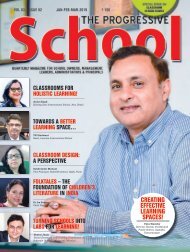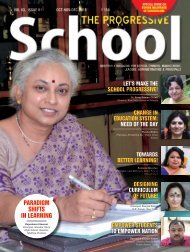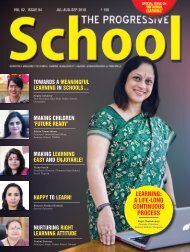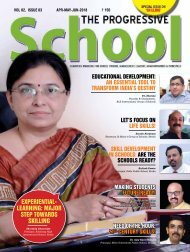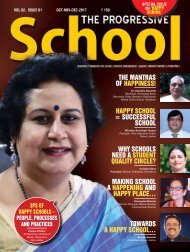The Progressive Teacher Vol 06 Issue 01
This issue of The Progressive Teacher focuses on "Futuristic School Cultures". In addition to articles by educators and school leaders, this issue introduces several new features including "World Education News", "Career Tips", "Photo Feature", and "Festivals of the World". Happy Reading!
This issue of The Progressive Teacher focuses on "Futuristic School Cultures". In addition to articles by educators and school leaders, this issue introduces several new features including "World Education News", "Career Tips", "Photo Feature", and "Festivals of the World". Happy Reading!
You also want an ePaper? Increase the reach of your titles
YUMPU automatically turns print PDFs into web optimized ePapers that Google loves.
WE NEED TO<br />
CHANGE THE WAY<br />
WE LOOK AT THINGS<br />
Roli Tripathi<br />
Embedding social-emotional learning<br />
into the classrooms will make curriculum<br />
more significant. For this, counselling<br />
should be provided to children from preprimary<br />
to senior classes.<br />
“<br />
Don’t limit a<br />
child to your<br />
own learning,<br />
for he was<br />
born in another<br />
time.<br />
-Tagore<br />
36| www.progressiveteacher.in<br />
“<br />
As humans, we can never<br />
detach ourselves from<br />
posterity. Our actions, dreams<br />
and our plans are all futurecentric.<br />
It’s imperative to understand<br />
that education can’t be kept away from<br />
the realm of new acceptances. <strong>The</strong>re is a<br />
need of futuristic schools that redefine the<br />
process of education. A changed pedagogy<br />
and technology is required alongside a<br />
prosperous and constructive school climate.<br />
We must have a goal that directs our<br />
thoughts, liberates our energy and<br />
inspires our hopes. Strong leadership,<br />
monitoring of students’ progress,<br />
a coherent curriculum and teacher<br />
collaboration are the factors affecting the<br />
effectiveness of educators.<br />
“For relational trust to develop and be<br />
sustained,” say Byrk and Schneider,<br />
“both staff and students must be able<br />
to make sense of their work together in<br />
terms of what they understand as the<br />
primary purpose of the school: Why are<br />
we really here?”<br />
We are at the precipice of a digital<br />
revolution that will change every aspect<br />
of our lives, with a global computer fabric<br />
changing the way we interact, work and<br />
live. <strong>The</strong> way students in India consume<br />
educational content is transforming due<br />
to technological invasion. Learning<br />
should be made fun. Students should<br />
learn about real-world issues and topics,<br />
rather than individual subjects. By<br />
learning the subjects through discovering<br />
real-world contexts students get the tools<br />
they need to function in the real world.<br />
<strong>The</strong> use of virtual reality (VR) in<br />
education is a revolutionary step. VR<br />
gives immediacy and control created by<br />
immersion: the feeling of “being there”.<br />
VR simulated objects can be heard,<br />
smelled, touched, hefted, and explored<br />
in many sensory ways, increasing the<br />
students’ cognitive abilities. Vygotsky’s<br />
theory states that the social context is<br />
important to the acquisition of domestic,<br />
vocational, and communication skills<br />
that can increase a child’s ability to do.<br />
A child can be gauged by his ability to<br />
engage with abstract concepts.


